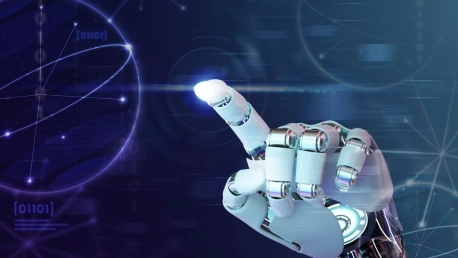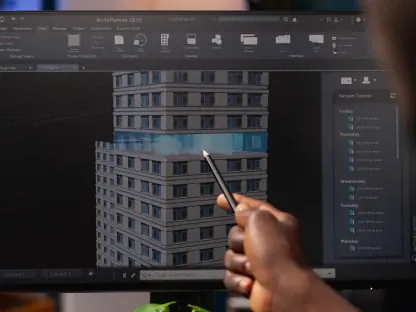The construction industry, known for its conservative approach to technology, is undergoing a significant shift with the integration of Artificial Intelligence (AI). This change affects all areas of construction, from design and planning stages to operations and project management. AI-driven technology addresses longstanding challenges within the industry, paving the way toward enhanced efficiency and sustainability.AI applications streamline design processes with the ability to analyze vast amounts of data for better planning. On construction sites, AI automates tasks, predicts project outcomes, and enhances on-site safety, leading to better risk management. In project management, AI tools enable real-time updates, decision-making support, and predictive maintenance for infrastructure, thereby extending its lifespan.By leveraging AI, the construction industry stands to make considerable progress in both productivity and innovation. The incorporation of AI tools offers a competitive edge to those firms willing to embrace this digital transformation, signaling a new era for construction where technology is a driving force in delivering projects on time, within budget, and with greater attention to environmental considerations. Through AI, the industry is witnessing a revolution that tackles long-standing inefficiencies and opens up a trajectory for smarter, future-focused development.
The Rise of AI in Construction
Emerging AI Applications
AI and machine learning technologies are creating waves in the construction industry by enhancing the way projects are planned and executed. Machine learning algorithms are now capable of digesting vast amounts of data to optimize construction planning, identifying the best pathways to project completion. This capability mitigates the risk of project overruns and ensures more reliable scheduling and budgeting. Similarly, AI’s predictive analytics can pinpoint potential site issues before they become larger problems, reducing downtime and enhancing the site’s operational efficiency.Moreover, AI is making construction sites smarter and more responsive. Through the assessment of real-time data, AI platforms can oversee progress and quality, ensuring adherence to established parameters. By predicting weather, labor, and material challenges, these platforms allow managers to reroute resources dynamically, significantly diminishing the risk of project stalls and cost escalations.
Productivity and Automation
Advancements in AI-driven machines redefine efficiency on the construction site. Autonomous vehicles operate around the clock, performing repetitive tasks such as excavating and prepping sites, work that once monopolized the time of human laborers. This frees skilled workers to focus on the tasks that require human insight and decision-making. The synchronization of human and machine labor optimizes productivity, completing projects faster and often with fewer errors.The surveillance of job sites has also become more sophisticated with AI. Real-time monitoring systems use AI to assess worker productivity and adherence to safety protocols. If a machine or worker deviates from the norm, the AI system can alert supervisors immediately to take corrective action. This ensures that potential issues can be recognized and rectified swiftly, upholding the pace and safety on the site.
AI-Driven Design and Project Management
Enhancing Architectural Design
In architectural design, AI lends a creative edge while grounding decisions in data. Through AI, designers can simulate countless scenarios, test structural options, and experiment with materials to find the most efficient, cost-effective, and aesthetically pleasing solutions. This method vastly reduces the trial and error typically involved in design processes, translating into lower costs and faster project completion times.Furthermore, by incorporating sustainability criteria, AI assists in creating buildings that not only meet current standards but also serve the needs of future generations. It does so by evaluating environmental impact and suggesting materials and designs that reduce a building’s carbon footprint. Considering the rise in global temperatures and the urgent need for sustainable practices, this function of AI can’t be overstated in its significance for the industry and the planet.
Managing Projects with AI
Within construction management, AI is a game-changer for safety and efficacy. By continuously analyzing potential risks on-site, AI systems can anticipate and avert accidents. When it comes to fleet management, IoT sensors collect real-time data from construction vehicles, aiding in predictive maintenance. This ensures that mechanical failures are addressed before they can cause costly on-site delays.AI’s prowess extends to resource allocation and progress tracking, offering precise overviews of where resources are and where they are needed most. The confluence of these functions within AI systems means projects can stay on schedule and within budget, with less human oversight and deeper analytical precision. Thus, project managers can benefit from predictive insights and automated processes, allowing them to focus on higher-value activities that leverage their expertise.
Tackling Industry Challenges
Addressing Labor Shortages
Labor shortages are a pain point for many construction firms, and AI is delivering solutions. Robots, such as those adept in masonry and prefabricated construction, are stepping in to perform labor-intensive tasks. This minimizes the effects of shortages and alleviates the burden on existing human workers. Not only does this continue the momentum of project timelines, but it also maintains a high standard of quality and consistency in the construction work carried out.AI’s ability to take on repetitive and physically demanding work extends the workforce, making each worker more productive. When workers are tasked with overseeing and managing AI-driven machines rather than performing the monotonous tasks themselves, they can redirect their skills to complex problem-solving, quality control, and other strategic activities that AI cannot replicate.
Risk Mitigation and Safety
The role of AI in risk mitigation goes beyond the proactive identification of physical hazards. Analyzing historical data, AI can forecast potential logistical and financial risks throughout the lifecycle of a project. This predictive capability is invaluable in crafting risk mitigation strategies and maintaining stringent safety standards. It means fewer delays, lower chances of injury, and protection against unforeseen expenses.Furthermore, AI-enabled machines are designed to perform in hazardous conditions, thus reducing the need for human exposure to risk. AI systems are constantly learning, adapting their risk assessments based on new data, which means that over time the system becomes increasingly adept at identifying and mitigating risks, making the construction environment safer and more predictable.
Productivity and Cost-Effectiveness
AI in On-Site Operations
AI is not limited to administrative roles; it is an integral part of on-site operations, wielding a significant influence on both productivity and cost-effectiveness. The adoption of AI-powered machinery for tasks such as excavation, welding, and concrete pouring speaks volumes about the capacity of AI in construction. The accuracy and speed with which these machines operate reduce the window for errors and rework, delivering quality results in shorter timeframes.Complementing the mechanized aspect of AI, cognitive computing can oversee operations, adjusting workflows in response to changing environments or project demands. This agility is an asset to managers who strive to adhere to project schedules and budgets. Furthermore, wearables equipped with AI not only enhance worker safety but can also generate data to optimize on-site productivity and personnel management.
Infrastructure and Fleet Management
Effective fleet management is pivotal in maintaining adherence to timelines and budgets. AI facilitates this through IoT data integration, enabling construction vehicles to be tracked in real time, providing valuable insights on usage patterns, and predicting maintenance needs to prevent downtimes. This level of oversight ensures that machinery is operating optimally, contributing to seamless site operations.Moreover, infrastructure management is another area that benefits significantly from AI. The continuous analysis of structural data determines maintenance needs, which safeguards the longevity of the investment. Regular reporting and predictions enable preemptive interventions, ensuring the robustness of infrastructure projects post-completion. AI algorithms can predict the lifespan of materials and suggest timely restorations or upgrades, thereby preserving the integrity of the infrastructure while managing future costs.
The Digital Transformation Journey
AI as a Competitive Advantage
Companies that incorporate AI early in their operations are poised to lead the pack in the construction industry. This technological edge is not simply a marker of innovation but a tangible competitive advantage that can manifest as increased efficiencies, enhanced safety, and an overall reduction in costs. To make the most of AI’s potential, construction leaders must invest in this arena and consider developing or adopting construction software that utilizes AI technology.A thoughtful AI strategy means not just implementing standalone technologies but creating a cohesive ecosystem where data, machines, and human workers are in sync. Such an investment will pay dividends by securing a firm’s place in a rapidly evolving industry and showcasing its commitment to future-ready construction practices.
AI – A Partner in Progress
For the early adopters, AI in construction is a herald of efficiency and innovation. Companies like Appinventiv provide a testament to what is possible when AI solutions are custom-tailored to suit the unique needs of a construction business. As the industry embraces AI, these technological partnerships will become increasingly significant, unlocking new potentials and redefining what is achievable.This technological partnership is not solely about bringing in new tools; it’s about reimagining the construction process itself. Custom AI solutions provide the impetus for businesses to elevate their operations, pushing the boundaries of what has been the norm in the industry. As a result, these early adopters become advocates for change, influencing peers and paving the way for a smarter, more sustainable future for construction worldwide.









